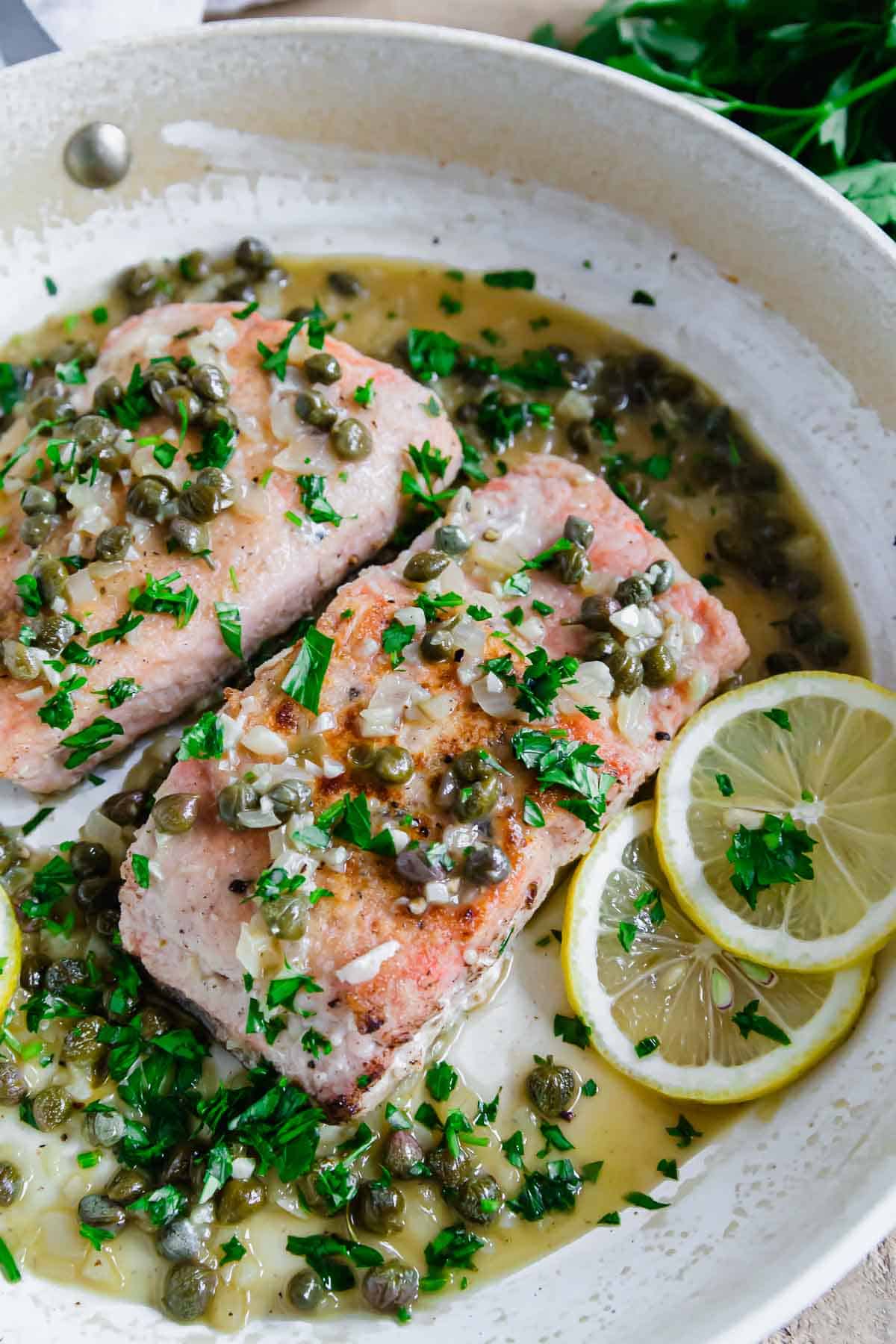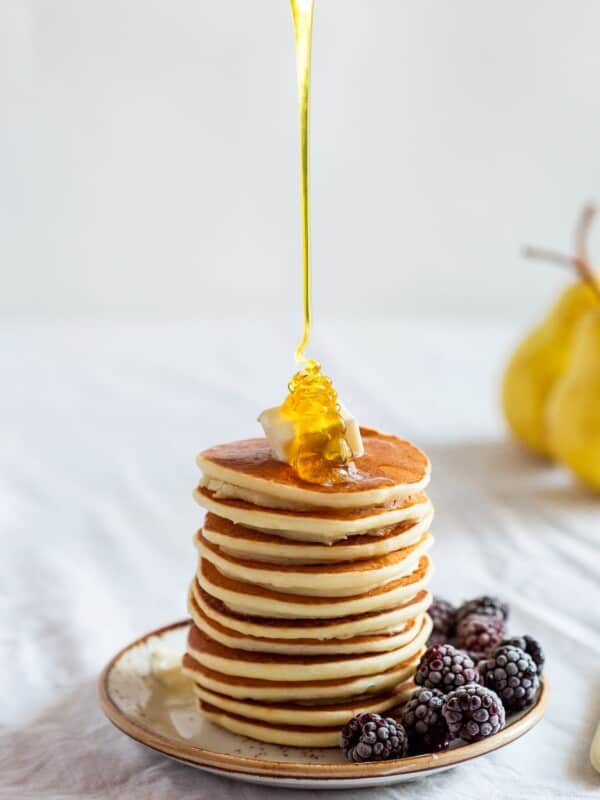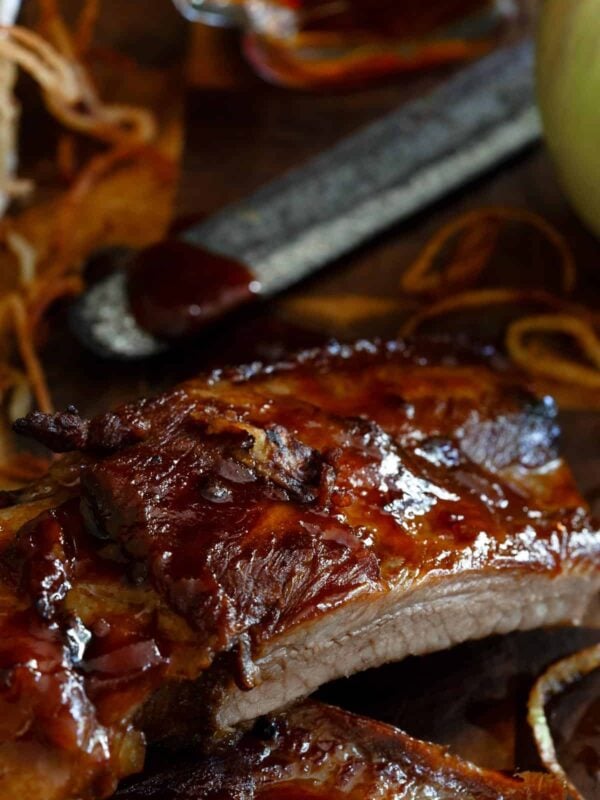Salmon piccata is a great weeknight meal. Ready in minutes and bursting with fresh, bright, and zesty flavor, it tastes like the classic Italian dish with a lighter seafood spin. With gourmet looks and taste, you’ll be shocked at how easily this meal comes together.

Why You Will Love This Salmon Piccata Recipe
Fast and easy: Salmon piccata can be made in under 25 minutes from start to finish with simple ingredients.
Restaurant quality: Save your money and make this Italian restaurant staple at home. At a fraction of the cost, you can enjoy the crave-worthy classic flavors of this dish in your kitchen.
Great for entertaining: This recipe will impress any guests and comes together with simplicity, so you don’t have to stress about the menu.
Easily adaptable: Simply swapping out the flour for gluten-free or almond flour, salmon piccata becomes a gluten-free friendly dish.

Ingredients
Salmon: Use fresh salmon or frozen filets that have been thawed and patted dry. Wild salmon is always preferable over farmed if you can source it.
Flour: All-purpose flour lightly coats the salmon before pan-searing. This gives it a nice restaurant-quality vibe.
Salt and pepper: Season the flour generously before dredging the salmon for extra flavor.
Olive oil and butter: Extra virgin olive oil and unsalted butter are heated in the pan to sear the salmon and get a nice golden brown crust on the fish.
Shallot: Shallots offer a more delicate flavor than onions and pair well with seafood.
Garlic: Minced fresh garlic cloves are best in this recipe, but jarred can be used in a pinch.
Capers: Capers’ briny, salty flavor is a quintessential piccata ingredient. They add a nice zing to the dish and enhance the overall taste. They’re the best part of this sockeye salmon recipe, too.
Chicken broth: This can be swapped for white wine or seafood broth/stock if you have it. The broth creates a nice light sauce for the piccata to coat the salmon.
Lemon juice: Fresh lemons are an essential part of piccata for the bright flavor they bring to the dish.
Lemon slices: Used primarily for garnish, fresh lemon slices are an eye-pleasing way to serve this recipe.
Fresh parsley: Minced parsley adds a bit of freshness and color to the dish right before serving.


Equipment
Skillet: A 10-inch cast iron skillet or non-stick skillet will work for this recipe.
Chef’s knife: There’s no specialized equipment needed to make salmon piccata, but a sharp knife is crucial for mincing the garlic and parsley and chopping the shallot.
Instructions
Here is a summary of the instructions. See the recipe card below for the full directions on how to make salmon piccata.
Pat the salmon dry with a paper towel. Combine the flour, salt, and pepper in a shallow bowl or dish. Dredge the salmon filets in the mixture, shaking off any excess flour. Set aside.
Heat the olive oil and one tablespoon of butter in a large skillet over medium-high heat. Once hot, add the salmon and cook until browned on each side, flipping carefully. Transfer salmon to a clean dish and set aside.
Add the remaining tablespoon of butter to the skillet. Reduce the heat to medium. Once melted, add the shallots, garlic and capers. Cook for one minute.
Pour in the lemon juice and chicken broth (or white wine). Stir to combine and bring to a simmer. Cook the sauce for about five minutes until reduced—season with additional salt and pepper to taste.
Gently place the salmon back into the skillet and spoon the piccata sauce over the filets. Cook for another minute until the fish is warmed through.
Remove from the heat, garnish with fresh parsley and lemon slices before serving.


Substitutions
You can easily make salmon piccata gluten-free by switching out the all-purpose flour for a gluten-free blend or almond flour. The rest of the recipe is naturally gluten-free friendly.
Variations
This recipe can be made with almost any other fish or protein. Cod piccata is a delicious seafood variation that’s just as easy.
Making the piccata creamy takes it from a light, bright-tasting dish to pure indulgence in every decadent bite. A touch of heavy cream stirred into the sauce at the end is all that is needed to make a creamy lemon salmon piccata recipe.

Storage
Whether you make this recipe ahead of time or have leftovers, follow these instructions on the best way to store the salmon piccata.
To store: Let the salmon cool to room temperature, then transfer it to an air-tight storage container and place it in the refrigerator for up to 5 days.
To reheat: Salmon piccata can be reheated in the microwave or on the stovetop in a pan. If reheating in a pan, add a splash of broth to keep the salmon from drying out.
To freeze: Allow the salmon to cool completely, then store in an air-tight container. Freeze for up to three months. Thaw overnight in the fridge when ready, then reheat until warmed through.
Serving Suggestions
Piccata is typically served with either rice or pasta and a simple vegetable on the side.
Roasted lemon asparagus is a simple side dish that pairs nicely with this meal since the flavors are similar to the piccata sauce. It’s also quick and easy to make so that it won’t draw out the total cooking time.

Salmon Piccata FAQs
What is piccata sauce made of?
Traditional Italian piccata sauce is made of butter, oil, fresh lemon juice, capers (along with their brine), and either stock or wine.
How do you cook the perfect piece of salmon?
The secret to a perfectly cooked piece of salmon is not to overcook it. The easiest way to do this is in a pan on the stovetop. Ensure the pan is nice and hot, and sear with the skin side up first. Do not move the salmon in the pan while it cooks. Let it cook for about four minutes — although this will depend on the thickness of your filet — until golden brown and crispy. Flip the filet, reduce the heat to medium, and finish cooking for another four minutes with the skin side down.
How do you thicken piccata sauce?
Piccata sauce is meant to be light and almost vinaigrette-like. It will cook down and thicken slightly in the pan. However, if you’d like to thicken the sauce further, stir in a small amount of cornstarch slurry before putting the salmon back in the pan. Alternatively, arrowroot starch or tapioca starch can be used to make the slurry.
What does piccata mean in Italian?
Piccata stems from the adjective piccato, meaning to pound flat. Veal piccata, the original piccata recipe, is always made with a thin veal cutlet. Regarding the dish, piccata means served in a sauce containing lemon, butter, and capers.

Related Recipes
Grab your skillet and gather your ingredients to make this incredibly delicious salmon piccata recipe next time you’re craving seafood but want an easy dinner you can make at home. Its bright, fresh taste will pull you in, and its easy preparation will make it a recipe you come back to time and time again.
Salmon Piccata

Ingredients
- 2 salmon filets 6 ounces each
- 1/4 cup all-purpose flour
- 1/2 teaspoon salt
- 1/4 teaspoon black pepper
- 1 tablespoon extra virgin olive oil
- 2 tablespoons butter divided
- 1 large shallot minced
- 4 cloves garlic minced
- ⅓ cup capers
- 2/3 cup chicken broth
- 1/3 cup fresh lemon juice about 2 lemons
- chopped fresh parsley for garnish
- lemon slices for garnish
Instructions
- Pat salmon dry with a paper towel. Combine the flour, salt, and pepper in a shallow bowl or dish. Dredge the salmon filets in the mixture, shaking off any excess flour. Set aside.
- Heat olive oil and 1 tablespoon of butter in a large skillet over medium-high heat. Once hot, add the salmon and cook until browned on each side, flipping carefully. Transfer salmon to a clean dish and set aside.
- Add the remaining tablespoon of butter to the skillet. Reduce the heat to medium. Once melted, add the shallots, garlic and capers. Cook for 1 minute.
- Pour in the lemon juice and chicken broth. Stir to combine and bring to a simmer. Cook the sauce for about 5 minutes until reduced. Season with additional salt and pepper to taste.
- Gently place the salmon back into the skillet and spoon the piccata sauce over top of the filets. Cook for another minute until the fish is warmed through.
- Remove from the heat, garnish with fresh parsley and lemon slices before serving.
Nutrition
Nutrition information is automatically calculated, so should only be used as an approximation.
This article originally appeared on Pink When.
Gina Matsoukas is an AP syndicated writer. She is the founder, photographer and recipe developer of Running to the Kitchen — a food website focused on providing healthy, wholesome recipes using fresh and seasonal ingredients. Her work has been featured in numerous media outlets both digital and print, including MSN, Huffington post, Buzzfeed, Women’s Health and Food Network.














I love chicken piccata and this is a great variation.